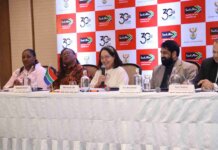Lima, the capital city of Peru is the next site to measure and perhaps cool the global ‘temperatures’ of international wildlife management politics that deeply divide the countries supporting the increase of food production from all sources as a basic human right, with those opposing the use of marine mammals as a means of subsistence sadly denying food access rights to many small or traditional coastal communities.
For the 69th time in its history, the International Whaling Commission (IWC) meets again in Lima Peru from 23 to 26 September 2024 in what is referred to as IWC 69.
The Republic of Guinea, with the co-sponsoring of Cambodia, Ivory Coast, Gambia, Ghana, Guinea-Bissau, Republic of Congo, Senegal, St. Kitts and Nevis, are sponsoring a Resolution on Food Security, calling upon the Commission to consider human rights and the food requirements of people, in whatever decision the Commission is taking.
Since the adoption of a moratorium on commercial whaling in 1982, the 88 members of the International Whaling Commission are divided into two factions.
The majority, approximately 50 countries, referred to as Anti-whaling are fiercely opposed to the use and harvesting of whale species.
The minority referred to as pro-sustainable use or Pro-whaling, approximately 20 countries, consider the abundant species of whales as just another source of subsistence.
Without considering the substance and the issues, almost all votes taken by the Commission at its meetings have been cast in accordance with this philosophical divergence.
In recent times, South Africa has been part of the first group (Anti) on the decisions taken by IWC, including the rejection of various sustainable use initiatives.
Will this Food Security Resolution be subjected to a similar fate at the IWC 69 in Peru?
Seven of the co-sponsors of the resolutions are African West Coast countries.
Even if they are not sponsors, 22 African countries (from Morocco to Namibia) with access to the Atlantic Ocean are all supportive of the Food Security Resolution under the umbrella of the Ministerial Conference on Fisheries Cooperation Among African States Bordering the Atlantic.
The anti-whaling side of IWC is opposed to the adoption of the Food Security Resolution as it believes it might encourage the consumption of whale meat.
“And why shall we exclude an abundant source of food which can be harvested sustainably, at a time when (according to UN) over 800 million humans suffer from malnutrition” says Lapointe, IWMC-World Conservation Trust President and former Secretary-General of CITES.
Where will South Africa stand on this issue?
It’s against this frustrating situation that South Africa’s pro-sustainable use Minister of Forestry Fisheries and Environment, Dr Dion George is widely expected to announce his arrival in international wildlife management politics and his position to support sustainable use which Section 24 of the constitution of South Africa supports.

Minister George’s declared support for communities to benefit from their natural resources in a recent television interview has already brought excitement to South African Indigenous communities. It has undoubtedly also brought excitement to the pro-sustainable use of African countries and other such countries worldwide.
“We have all the natural assets [needed] to . . . generate sustainable jobs,” said Minister George. “We are naturally endowed, and we need to use those assets [for] the benefit of the people/communities . . . because those resources belong to them and [at the same time] make sure we are not . . . destroying [our] natural heritage.”
In the process, Forestry, Fisheries and Environment Minister George would have found an opportunity to announce that he is not only South Africa, but Africa and the whole world’s breath-of-fresh-air food security new ally who can help make indigenous and coastal communities worldwide to reclaim their basic rights to adequate food and nutrition.
“While food security is a broad and complex issue requiring multifaceted approaches and significant resources, focusing on the right to food allows us to target our efforts more effectively,” said the statement issued by the Republic of Guinea. “This approach enables us to propose actionable measures that are feasible within the existing structures and capacities of the IWC and its Member States.”
Unlock Exclusive Content!








